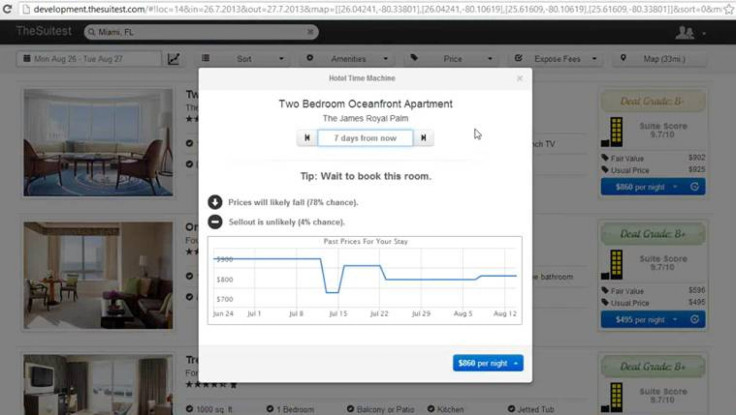TheSuitest’s ‘Hotel Time Machine’ Uses Wall Street Techniques To Predict Future Room Rates

Have you ever purchased a hotel room online and then found yourself playing the “what if” game? What if you purchased too soon? What if the price was about to go down? What if you had only waited one more week? Now, hotel search engine startup TheSuitest has introduced a groundbreaking prediction feature that it’s calling a veritable “Hotel Time Machine.”
Live as of late Wednesday night, the new forecasting function promises a “glimpse into the future of room rates and availability” for the most popular 33 destinations across the United States, with more cities on the way. The feature allows travelers to see how the price and availability of a room will evolve over a 30-day period, and provides recommendations to help determine the best time to book the best deal.
TheSuitest hopes to push the envelope in hotel room search technology to carve a niche for itself in the ever-competitive arena for online travel comparison. “The new feature tells you when would be a good time to book -- immediately or in a week from now -- because it really matters to your bottom line,” explained TheSuitest co-founder Jeremy Murphy, a former quantitative finance analyst at Goldman Sachs. “The price could change by up to 80 percent in a few days, and it saves you money by not letting you fall victim to buying on a Friday night right after the hotel’s revenue manager has jacked up the price.”
Price forecasting is a familiar feature on airfare sites like Kayak or Bing Travel, but has never before been attempted in the hotel sector, according to Murphy. “This was a huge undertaking from a modeling standpoint,” he said. “Unlike similar features with flights that price, say, a coach seat leaving Los Angeles, we have to look at every room type in Los Angles to understand everything about it on a granular level. That’s way more difficult, which is why nobody else has done it.”
Murphy said there are layers upon layers of features that go into predicting what a room is going to do tomorrow, and added that TheSuitest’s model is so complex that it almost knows what a hotel’s revenue manager is going to do before the manager does. How? The “time machine” uses the same event-modeling techniques that hedge funds use to determine whether a mortgage-backed security will default.
As Murphy put it, the site “crunches pricing information with complex algorithms to help users make an immediate, data-driven decision about where and when to book.” That information is then displayed on a user-friendly graph for bookings up to six months in advance. Through these techniques borrowed from Wall Street, TheSuitest can also analyze billions of amenities and room prices from a variety of third party sources down to the style of flooring and the size of the TV.
Murphy and co-founder Michael Aucoin (a former software developer for Microsoft and DreamWorks) launched TheSuitest into public beta this spring with functionality that pits high-end hotel rooms against each other based on granular amenities and other factors beyond the pricing, availability and location. Among its unique capabilities, the site can expose hidden fees like in-room Wi-Fi and parking to come up with a truer idea of the total cost. The goal is to help travelers know how their hotel room compares to others like it in the same city in terms of quality, size and amenities using a 10-point scoring system.
“Should I be paying this much more for a water view room in Miami versus one that doesn’t have a water view? That’s the kind of actionable information we give you,” Murphy said. “So while other sites basically say ‘here is the best base rate,’ we are trying to dig into the information the same way an analyst would determine if this is a good or bad stock to buy.”
TheSuitest hopes to roll out its offerings into more cities across the U.S. and perhaps expand globally within the next few months.
© Copyright IBTimes 2024. All rights reserved.






















